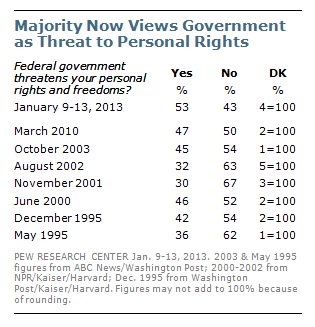53% Say the Federal Government Threatens their “Rights and Freedoms”
The president’s second inaugural address was what Charles Krauthammer and Charles R. Kessler, respectively, called an “ode to big government” and a “[reinterpretation of] American principles.” It was, in many ways, unapologetic and decidedly to the left of any inaugural oration delivered in modern American history -- and a far cry from the Lincolnian ideal. Ironically, however, while the American public evidently endorsed the status quo (i.e., trillion dollar plus-deficits, more bureaucracy, and bigger government) by re-electing the president, more Americans than ever believe that the federal government threatens their “rights and freedoms”:
As Barack Obama begins his second term in office, trust in the federal government remains mired near a historic low, while frustration with government remains high. And for the first time, a majority of the public says that the federal government threatens their personal rights and freedoms.
The latest national survey by the Pew Research Center for the People & the Press, conducted Jan. 9-13 among 1,502 adults, finds that 53% think that the federal government threatens their own personal rights and freedoms while 43% disagree.In March 2010, opinions were divided over whether the government represented a threat to personal freedom; 47% said it did while 50% disagreed. In surveys between 1995 and 2003, majorities rejected the idea that the government threatened people’s rights and freedoms.The growing view that the federal government threatens personal rights and freedoms has been led by conservative Republicans. Currently 76% of conservative Republicans say that the federal government threatens their personal rights and freedoms and 54% describe the government as a “major” threat. Three years ago, 62% of conservative Republicans said the government was a threat to their freedom; 47% said it was a major threat.
Here’s the accompanying graph which shows just how much public opinion has changed over the last decade:
If a slim majority of Americans generally believe that the federal government threatens their liberty and constitutional freedoms, why on earth did they re-elect a guy who drastically expanded it? My hunch is that people are leery of big government generally, but when Republicans talk specifically about cutting government programs -- such as Social Security, Medicare, Medicaid, and food stamps -- Americans turn the other cheek and vote for Democrats. To make matters worse, during the last election cycle the GOP was not seen as the party of opportunity; it was seen (however unfairly) as the party of “millionaires and billionaires” and “one-percenters,” and thus prevented Mitt Romney from connecting with the middle and working classes.
And yet Pew’s latest finding shows rather convincingly that most Americans fear the expansive overreach of Washington bureaucrats -- as they should. But now it’s up to conservative Republicans to harness that message by reaching out to every American and explaining why their policies will lead to a smaller, less intrusive federal government -- one that (a) protects their freedoms and individual rights and (b) keeps America’s safety net programs solvent for the next generation.
This is a task easier said than done, of course, but one that is absolutely necessary if we want to end the latest “era of big government” and bring constitutional conservatism back into the mainstream.


No comments:
Post a Comment